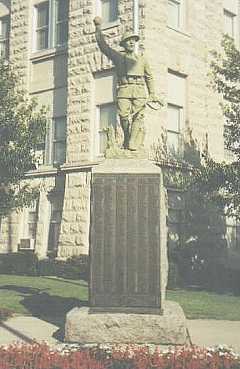BOLIVAR, MISSOURI
N 37° 36.844 / W 093° 24.655
Copyright version 1920, sheet bronze.
Smithsonian Art Inventory Control Number: NO ENTRY.
Copyright version 1920, sheet bronze.
Smithsonian Art Inventory Control Number: NO ENTRY.
On Polk County Courthouse Square at corner of Highway 32 (East Broadway) and South Main Street.
The large plaque inscription on the front of the base reads:
1917 – WORLD WAR HONOR ROLL POLK COUNTRY, MISSOURI – 1919
DIED IN ACTIVE SERVICE
(followed by 30 names in six columns, followed in turn by 740 names in six columns)
A horizontal plaque inscription in the ledge below the large plaque reads:
THE FOLLOWING NAMES WERE OMITTED FROM THE LARGE TABLET
(followed by 53 more names in six columns)
1917 – WORLD WAR HONOR ROLL POLK COUNTRY, MISSOURI – 1919
DIED IN ACTIVE SERVICE
(followed by 30 names in six columns, followed in turn by 740 names in six columns)
A horizontal plaque inscription in the ledge below the large plaque reads:
THE FOLLOWING NAMES WERE OMITTED FROM THE LARGE TABLET
(followed by 53 more names in six columns)
The Doughboy, believed to have been funded by the Polk County Court Commission, was dedicated November 11, 1925 in a ceremony in which the Howard Keeling American Legion Post and Boy Scouts played major roles. The parade included veterans and students, a large German Krupp howitzer bearing scars from being hit by Allied guns, and two mounted German machine guns. (The howitzer was at the Doughboy site for many years.) The Doughboy was unveiled by Ruth Keeling, sister of Howard Keeling, a Polk County man who sacrificed his life, for whom the Bolivar American Legion Post was named.
This is one of just four Viquesney Doughboys known to have copyright marks reading “Copyright Walter Rylander 1920.” Walter Rylander of Americus, Georgia, was Viquesney's business partner and one of the WWI veterans who was said to have posed in wartime gear as one of the models for the Doughboy, which may only be partially correct: According to Viquesney himself, the statue's face is a composite of at least 50 different WWI veterans, and he never mentioned Rylander as one of them.
In 1922 Viquesney was sued by Jules Berchem, operator of American Art Bronze Foundry of Chicago, Illinois, for copyright infringement in regard to a similar-looking statue they produced, John Paulding's "Over the Top". In January that year, Viquesney, perhaps in an attempt to raise money for an out-of-court settlement, sold all the rights to his Doughboy to Rylander, who then controlled Viquesney's American Doughboy Studios for the next four years until January 1926, when Viquesney regained the rights.
Other known Rylander copyright marks are on Doughboys at Sedalia, Missouri, St. Bernard, Ohio, and Muskogee, Oklahoma.
The Doughboy was cleaned in 1991 and has a brown coating. It appears to be in good condition.
A nearby memorial with Army, Navy, Air Force, Marine, and Coast Guard symbols, was dedicated May 27, 1996 to honor those who served in all wars and conflicts.
This is one of just four Viquesney Doughboys known to have copyright marks reading “Copyright Walter Rylander 1920.” Walter Rylander of Americus, Georgia, was Viquesney's business partner and one of the WWI veterans who was said to have posed in wartime gear as one of the models for the Doughboy, which may only be partially correct: According to Viquesney himself, the statue's face is a composite of at least 50 different WWI veterans, and he never mentioned Rylander as one of them.
In 1922 Viquesney was sued by Jules Berchem, operator of American Art Bronze Foundry of Chicago, Illinois, for copyright infringement in regard to a similar-looking statue they produced, John Paulding's "Over the Top". In January that year, Viquesney, perhaps in an attempt to raise money for an out-of-court settlement, sold all the rights to his Doughboy to Rylander, who then controlled Viquesney's American Doughboy Studios for the next four years until January 1926, when Viquesney regained the rights.
Other known Rylander copyright marks are on Doughboys at Sedalia, Missouri, St. Bernard, Ohio, and Muskogee, Oklahoma.
The Doughboy was cleaned in 1991 and has a brown coating. It appears to be in good condition.
A nearby memorial with Army, Navy, Air Force, Marine, and Coast Guard symbols, was dedicated May 27, 1996 to honor those who served in all wars and conflicts.





